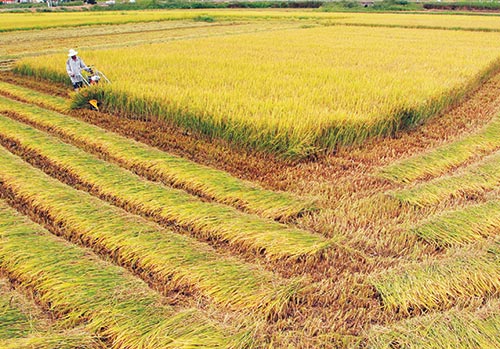Bright prospects for agriculture

Vietnam is one of the important agriculture hubs in the Asia-Pacific Photo: Le Toan
Vietnam is currently the second biggest rice exporters in the world after Thailand, and also the second largest coffee exporter following Brazil. The nation, in addition, is the biggest pepper exporter. This reflects Vietnam’s global agricultural potential.
Although Vietnam has great natural advantages, its agricultural products are often eyed as being low-quality in comparison with other countries like Thailand.
Analysts blame these shortcomings on a lack of advanced solutions and technologies and foreign firms, including those from Germany are keen on the potential benefits.
Germany’s BASF, the world’s leading chemical company, launched its crop protection business in Vietnam last year as part of their efforts to boost yields per hectare, breed drought resistant crops, control weeds, and improve crop quality.
BASF has now dispensed with their local distributor, and will from now on market its crop protection products directly in Vietnam. These include the company’s AgCelence products, for example the Headline fungicide, which offers excellent disease control, as well as improved yield, stress tolerance and quality of crops.
“Vietnam is one of the most important agriculture centres in the Asia Pacific,” said Raman Ramachandran, senior vice president, Crop Protection Asia Pacific, BASF, “and Vietnamese farmers are facing unique challenges, such as the need to increase the yields and quality of crops in a sustainable manner, high quality standards and tough to control weeds and diseases. We aim to provide Vietnamese farmers with the full benefits of our innovative crop protection products.”
Germany’s Bayer CropScience is also active in Vietnamese agriculture sector. The company offers a wide range of products including high value seeds, innovative crop protection solutions based on chemical and biological modes of action, as well as an extensive service backup for modern, sustainable agriculture.
Bayer Vietnam’s CropScience subsidiary underlined that the company would continue working with Vietnam’s government, localities and farmers to apply climate-smart agricultural technologies to act as a driver of green growth for the rapidly industrialising country, where 70 per cent of the population relies on agriculture for survival.
The growing investment trend in Vietnam’s agriculture is also highlighted by companies in Vietnam and also from other countries like Japan and South Korea.
The Hoang Anh Gia Lai Group, one of leading private companies in Vietnam since 2013 has felt justified in abandoning property projects to shift to agriculture. The company has also begun a new programme to raise 100,000 cattle. Doan Nguyen Duc, chairman of the company, estimated cattle-rearing would add VND4 trillion ($190.5 million) to the firm’s annual revenues.
Tan Tao – an industrial group that has virtually no experience in agriculture – surprised business observers when it announced the launch of ITA Rice, a fragrant rice export and research company, to cultivate rice paddies on 60.3 hectares in the Mekong Delta province of Long An. The company plans to expand its cultivation to 5,000ha in the coming years.
Major transnational groups are also increasing their participation in Vietnam’s agricultural sector. Metro Cash & Carry is increasing investment in seafood, while Nestle is targeting coffee, and consumer giant Unilever is dipping its toes in the tea sector.
What the stars mean:
★ Poor ★ ★ Promising ★★★ Good ★★★★ Very good ★★★★★ Exceptional
Latest News
More News
- Hermes joins Long Thanh cargo terminal development (February 04, 2026 | 15:59)
- SCG enhances production and distribution in Vietnam (February 04, 2026 | 08:00)
- UNIVACCO strengthens Asia expansion with Vietnam facility (February 03, 2026 | 08:00)
- Cai Mep Ha Port project wins approval with $1.95bn investment (February 02, 2026 | 16:17)
- Repositioning Vietnam in Asia’s manufacturing race (February 02, 2026 | 16:00)
- Manufacturing growth remains solid in early 2026 (February 02, 2026 | 15:28)
- Navigating venture capital trends across the continent (February 02, 2026 | 14:00)
- Motivations to achieve high growth (February 02, 2026 | 11:00)
- Capacity and regulations among British areas of expertise in IFCs (February 02, 2026 | 09:09)
- Transition underway in German investment across Vietnam (February 02, 2026 | 08:00)
















 Mobile Version
Mobile Version